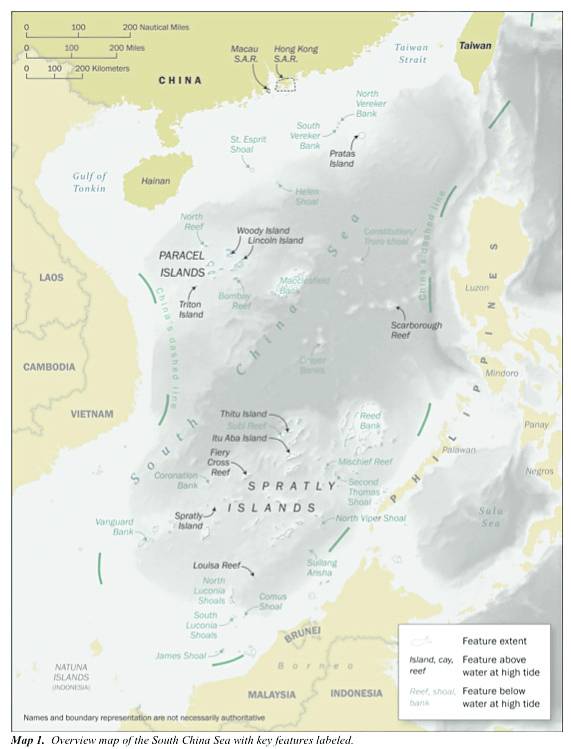
DASHED: A screenshot taken from the US Department of State’s website shows a map of the South China Sea that was among the materials used to analyze China’s claim over an
area encompassed by the so-called nine-dash line. In a 47-page study, the department said Beijing’s maritime claims in the South China Sea are “inconsistent with international law as
reflected in the 1982 United Nations Convention on the Law of the Sea.”
MANILA, Philippines — The US Department of State’s 47-page study debunking China’s “expansive” maritime claims in the South China Sea (SCS) is part of an “ongoing consolidation” of international support for the 2016 arbitral ruling that Manila won over Beijing in The Hague, the Philippines’ former top diplomat said on Saturday.
Along with the United States, other countries like France, Germany, the United Kingdom, Australia, and the Philippines’ Asian neighbors now invoke the ruling against China’s “preposterous claims” former Foreign Secretary Albert del Rosario said in a statement released by Stratbase ADR Institute.
“What is remarkable in the 2022 study of the US state department is that it draws heavily from the … ruling won by the Philippines … against China,” he said. “We believe that this is part of an ongoing consolidation of positions around the 2016 arbitral ruling among those who adhere to the rule of law in international relations.”
In 2013, the Philippines challenged China’s nine-dash line claims that encompassed most of the West Philippine Sea, waters within the country’s 370-kilometer exclusive economic zone. The international arbitral tribunal ruled to invalidate China’s claims to virtually the entire South China Sea.
‘Plainly inconsistent’
The Office of Ocean and Polar Affairs under the state department’s Bureau of Oceans and International Environmental and Scientific Affairs said in its “Limits in the Seas No. 150” study that China’s claims were “inconsistent with international law” as reflected in the 1982 United Nations Convention on the Law of the Sea (Unclos).
More specifically, the Jan. 12 report said China’s claim to “historic rights” in the South China Sea “is plainly inconsistent with maritime law.”
The claim “exceeds [China’s] possible maritime entitlements provided for in the international law of the sea,” the report said.
It stressed that the United States and many other states protested against China’s “historic rights” claim that was “rejected by the tribunal in The South China Sea Arbitration.”
Del Rosario said the Philippines, through the arbitral ruling, made an impact by calling out China’s “continuing deployment of brute force.”
Focus on 4 claims
“Confronting China over its illegal claims in the SCS is an intergenerational struggle. We should elect a government that would strongly fight for what is ours and for all nations to uphold the rule of law,” he said, making a reference to the May national elections.
The US study focused on four maritime claims invoked by China.
One is the “sovereignty claims” over more than 100 features submerged during high tide, which the state department said were “beyond the lawful limits of any state’s territorial sea.”
Another is the “straight baselines” that China had “either drawn or asserts the right to draw” to meet the geographic criteria under the convention in order to justify its claims over four “island groups,” namely, Dongsha, Xisha, Zhongsha, and Nansha (including the Spratly Islands).
The report said the normal baseline method cannot be used by China to claim Panatag (Scarborough) Shoal, a traditional Filipino fishing ground.
It said that the two main features of the Zhongsha “island group”—Panatag Shoal and Macclesfield Bank—were “geographically isolated” from each other. They are about 289 kilometers apart, with waters between them reaching a depth of more than 4,000 meters.
China uses the third basis, “maritime zones” over internal waters, to justify its jurisdictional claims. The fourth, “historic rights,” does not specify the nature nor the geographic extent of China’s claims, the report said.
China cries distortion
Brunei, Indonesia, Malaysia, Singapore, Taiwan, and Vietnam also claim all or parts of the South China Sea.
The state department said the study was part of a series meant to “examine a coastal state’s maritime claims and/or boundaries and assess their consistency with international law.”
In reaction, China said the US report “distorts international law and misleads the public.”
“The United States refuses to sign the convention but portrays itself as a judge and wantonly distorts the treaty,” foreign ministry spokesperson Wang Wenbin said on Thursday. “In seeking its own selfish interests, it uses multiple standards to carry out political manipulation,” Wang said.
The Philippines and China are signatories to the Unclos while the United States is not.
‘Outright falsity’
Del Rosario noted that the US report showed that China’s claims “are stunning in their outright falsity,” such as asserting sovereignty over underwater features like they were land territories.
“For instance, Mischief (Panganiban) Reef forms part of the waters of the Philippines but China claims Mischief Reef as if it were land territory—thereby artificially and illegally converting the reef as one of its air and naval bases within the exclusive economic zone of the Philippines,” Del Rosario said.
The report said China’s claims to sovereignty over maritime features did not meet the definition of an “island,” are entirely beyond a lawful territorial sea, inconsistent with international law, and are not recognized by the United States and other states.
It said that despite China’s claim to historic rights over the waters, it had not provided “specific information regarding the geographic extent” to back it up.
Given that the claim itself is “defective in its vagueness,” the report pointed to an earlier 2014 study which stated that “the law of the sea does not permit” entitlements of other coastal state-claimants “to be overridden by another state’s maritime claims that are based on ‘history.’”

